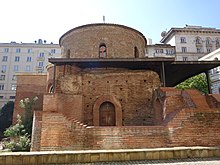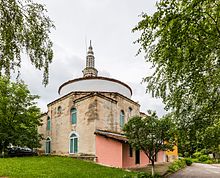Religion in Bulgaria
Religion in Bulgaria (2011 census)[1]
Religion in Bulgaria (Eurobarometer September 2019)[2]
| Religion by country |
|---|
|
|

Religion in Bulgaria has been dominated by Christianity since its adoption as the state religion in 865. The dominant form of the religion is Eastern Orthodox Christianity within the fold of the Bulgarian Orthodox Church. During the Ottoman rule of the Balkans, Sunni Islam spread in the territories of Bulgaria, and it remains a significant minority today. The Catholic Church has roots in the country since the Middle Ages, and Protestantism arrived in the 19th century.
In the latest years, there has been a decline of both the historic religions of Bulgaria—Orthodox Christianity and Islam—, which shrank respectively from 86% in 1992 to 84% in 2001 to 61% in 2011 and from 13% in 1992 to 12% in 2001 to 8% in 2011. In the 2011 census, the question about the religious affiliation became optional, and thus 21.8% of the total population didn't answer.[1] Until the census of 1992, Bulgarians were obliged to declare the historic religious belonging of their parents and/or ancestors, while since 2001 people were allowed to declare personal belief in a religion or unbelief in any religion (irreligion and atheism).[3] After the end of the People's Republic of Bulgaria (1946–1990), the revival of Islam was stronger than Orthodox Christianity.[3] The Bulgarian Orthodox Church has seen the most serious decline from 2001 onwards.[3] The church's credibility has been undermined since the 1990s by its collaboration with the erstwhile Communist regime,[4] fully revealed with the opening of the state's secret archives in 2012, according to which eighty percent of the clergy were members of the secret police.[5]
The Constitution of Bulgaria designates Orthodox Christianity as the "traditional" religion of the country, but guarantees the free exercise of any religion.[6] Bulgaria has not experienced any significant ethnic or religious confrontation, unlike the case in former Yugoslavia in the 1990s. The religious communities in the country coexist peacefully. In fact, the capital Sofia is known for its so-called Square of Religious Tolerance; the St Nedelya Church, St Joseph Cathedral, Banya Bashi Mosque and Sofia Synagogue are located within metres of each other in the very centre of the city.
Demographics[]


Censuses' data[]
| Religion | 1992[7] | 2001[8] | 2011[1][9] | |||
|---|---|---|---|---|---|---|
| Number | % | Number | % | Number | % | |
| Christianity | 7,350,016 | 86.6 | 6,638,870 | 83.73 | 4,487,554 | 60.9 |
| –Bulgarian Orthodox Church | 7,274,479 | 85.71 | 6,552,751 | 82.64 | 4,374,135 | 59.4 |
| –Protestantism | 22,067 | 0.26 | 42,308 | 0.53 | 64,476 | 0.9 |
| –Catholic Church | 53,470 | 0.63 | 43,811 | 0.55 | 48,945 | 0.7 |
| Islam | 1,111,838 | 13.1 | 966,978 | 12.2 | 577,139 | 7.9 |
| Other | 11,882 | 0.14 | 14,937 | 0.19 | 11,444 | 0.1 |
| No religion | - | - | 308.116 | 3.88 | 682,162 | 9.3 |
| No answer | - | - | - | - | 1,606,269 | 21.8 |
| Total population | 8,487,317 | 100.0 | 7,928,901 | 100.0 | 7,364,570 | 100.0 |
Line chart[]
Detailed 2011 census' data[]

The results of the Bulgarian census of 2011, in which the indication of answer regarding the question for confession was optional, are as follows:[1]
| Group | Population | % of those who answered | % of the total population |
|---|---|---|---|
| Eastern Orthodox Church | 4,374,135 | 76.0% | 59.4% |
| Undeclared | 1,606,269 | - | 21.8% |
| Irreligion | 682,162 | 11.8% | 9.3% |
| Sunni Islam | 546,004 | 9.5% | 7.4% |
| Protestantism | 64,476 | 1.1% | 0.9% |
| Catholicism | 48,945 | 0.8% | 0.7% |
| Shia Islam | 27,407 | 0.5% | 0.4% |
| Unaffiliated Muslims | 3,728 | 0.1% | 0.1% |
| Oriental Orthodox Christianity | 1,715 | 0.0% | 0.0% |
| Judaism | 706 | 0.0% | 0.0% |
| Others | 9,023 | 0.2% | 0.1% |
| Figure of percentage | - | 5,758,301 | 7,364,570 |
Religions by ethnic group (2001 census)[]
The results of the Bulgarian census of 2001 by ethnic groups, the latest census in which the indication of identification (whether by confession or as irreligious) in the question for confession was obligatory, are as follows:[10][11]
| Total | Bulgarians | Turks | Romani | Others | ||||||
|---|---|---|---|---|---|---|---|---|---|---|
| Number | % | Number | % | Number | % | Number | % | Number | % | |
| Orthodoxy | 6,552,751 | 82.6 | 6,315,938 | 94.9 | 5,425 | 0.7 | 180,326 | 48.6 | 51,062 | |
| Islam | 966,978 | 12.2 | 131,531 | 2.0 | 713,024 | 95.5 | 103,436 | 27.9 | 18,987 | |
| None | 308,116 | 3.9 | 151,008 | 2.3 | 23,146 | 3.1 | 59,669 | 16.1 | ||
| Catholic Church | 43,811 | 0.6 | 37,811 | 0.6 | 2,561 | 0.3 | ||||
| Protestantism | 42,308 | 0.5 | 14,591 | 0.2 | 2,066 | 0.3 | 24,651 | 6.6 | 1,000 | |
| Others | 14,937 | 0.2 | 4,331 | 0.1 | 442 | 0.1 | ||||
| Total population | 7,928,901 | 100.0 | 6,655,210 | 100.0 | 746,664 | 100.0 | 370,908 | 100.0 | 100.0 | |
Religious groups and life stances[]
Christianity[]
Eastern Orthodox Christianity[]
By far the dominant religion in Bulgaria is Eastern Orthodox Christianity, professed by the prevalent ethnic group, the Bulgarians, who are adherents of the Bulgarian Orthodox Church. Approximately 60% of the Bulgarians belonged to the church as of 2011.[1] Other Orthodox churches represented in the country by minorities are the Russian Orthodox Church, Ukrainian Orthodox Church, Romanian Orthodox Church and Greek Orthodox Church.
Christianity was established in the First Bulgarian Empire under Boris I in the middle of the 9th century, although it has had its roots in the Balkans since the 1st century and the mission of Apostle Paul. The rise of the Bulgarian Empire made the Bulgarian Orthodox Church autocephalous in 919, becoming the first new Patriarchate to join the initial Pentarchy. The Bulgarian Orthodox Church is the oldest among the Slavic Orthodox churches and has considerably influenced the rest of the Slavic Orthodox world by means of its rich literary and cultural activity in the Middle Ages, as well as by the invention of the Cyrillic script in Bulgaria.
Catholic Church[]

Catholicism has its roots in Bulgaria and the Middle Ages. It was spread among the Bulgarians by Bulgarised Saxon ore miners in northwestern Bulgaria (around Chiprovtsi) and by missionaries among the Paulician and Bogomil sectarians, as well as by Ragusan merchants in the larger cities. The total number of the Catholics in the country accounted for 0.8% of the population in 2011.[1]
Today the bulk of the Catholic population of Bulgaria lives in Plovdiv Province, centred on Rakovski, as well as in some villages in northern Bulgaria. The Banat Bulgarians are a Bulgarian minority in Romania and Serbia adhering to Catholicism. Besides Bulgarians, among the Catholics are also many foreigners.
The Bulgarian Greek Catholic Church, a Byzantine Rite church united with Rome, was formed in the 19th century as part of the Bulgarian church struggle in order to counter the influence of the Patriarch of Constantinople, and has some 10,000 members today.
Protestantism[]

Protestantism in its various forms arrived in the 19th century because of missionaries, mainly from the United States. Today it is a quickly growing confession, with membership having tripled from 1992 to 2011. They comprised 0.9% of the total population in 2011.[1] Half of the Protestants in Bulgaria are newly converted Roma, while the other half are for the most part Bulgarians. The Union of Evangelical Congregational Churches in Bulgaria is a fruit of American missionaries in the 19th century.
Armenian Apostolic Christianity[]
The majority of the Armenians in Bulgaria are members of the Armenian Apostolic Church, which has an eparchy in the country based in Sofia. Most Armenian Apostolics live in Plovdiv, Sofia, Varna or Burgas.
Irreligion: atheism and agnosticism[]
According to the 2011 census 21.8% of the Bulgarians did not respond to the question about religion, while a further 9.3% declared a strong stance of irreligion (atheism, agnosticism).[9]
Islam[]

Islam is the second largest religion in Bulgaria, representing about 8% of the population in 2011.[1] It is professed by the Turkish minority, the Muslim Bulgarians (Pomaks) and some of the Roma. The former two are concentrated in the Rhodopes, a massif in southern Bulgaria, but are present in clusters in other parts of the country, for instance the Turks in the Ludogorie region and the Pomaks in the Rhodopes and some villages in northern Bulgaria. Today, Muslims form the majority in Kardzhali Province and Razgrad Province (mostly Turks) and Smolyan Province (mostly Bulgarians).
Islam arrived with the Ottoman Turkish conquest of the Balkans in the 14th-15th century. Turkish notables settled in the larger cities (Plovdiv, Sofia, Varna, etc.), while peasants from Anatolia arrived in the Ludogorie and the Rhodopes. Many Orthodox Christians and Paulicians converted to Islam, often voluntarily due to the peculiarities of the Ottoman millet system, but sometimes forcefully. After the Liberation of Bulgaria in 1878 many Muslims were massacred and forcefully deported to the remaining Ottoman territories.
Judaism[]

Despite its low number today, Bulgaria's Jewish population exerted considerable cultural influence on the country in the past and is still of importance today. The Jews in Bulgaria are concentrated in the larger cities, mostly in the capital Sofia.
References[]
- ^ a b c d e f g h "Население по местоживеене, възраст и вероизповедание". National Statistical Institute of Bulgaria. Archived from the original on 3 March 2018.
- ^ Special Eurobarometer 493, European Union: European Commission, September 2019, pages 229–230 Retrieved 17 January 2020. The question asked was "Do you consider yourself to be...?" With a card showing: Catholic, Orthodox Christian, Protestant, Other Christian, Jewish, Muslim - Shia, Muslim - Sunni, Other Muslim, Sikh, Buddhist, Hindu, Atheist, Non believer/Agnostic and Other. Also space was given for Refusal (SPONTANEOUS) and Don't Know. Jewish, Sikh, Buddhist and Hindu did not reach the 1% threshold.
- ^ a b c Seligman 2014, p. 83.
- ^ Ghodsee 2009, p. 93.
- ^ Djankov, Simeon (2014). The Great Rebirth: Lessons from the Victory of Capitalism over Communism. Columbia University Press. p. 145. ISBN 9780881326987.
- ^ "The Bulgarian Constitution". Bulgarian Parliament.
- ^ Giordano, Kostova & Lohmann-Minka 2000, p. 108.
- ^ "Population by Districts and Religion Group as of 2001". National Statistical Institute of Bulgaria. Archived from the original on 23 February 2017.
- ^ a b "People and Society :: Bulgaria – Religions". The World Factbook. CIA.
Religions among the Bulgarian population: Eastern Orthodox 59.4%, Muslim 7.8%, other (including Catholic, Protestant, Armenian Apostolic Orthodox, and Jewish) 1.7%, none 3.7%, unspecified 27.4% (2011 est.)
. - ^ "Структура на населението по вероизповедание (Structure of the population by confession)". National Statistical Institute of Bulgaria. Archived from the original on 19 September 2017.
- ^ "Етнически малцинствени общности (Ethnic minority communities)". National Statistical Institute of Bulgaria. Archived from the original on 24 August 2017.
Sources[]
- Giordano, Christian; Kostova, Dobrinka; Lohmann-Minka, Evelyne (2000). Bulgaria: Social and Cultural Landscapes. University Press. ISBN 9783727813269.
- Ghodsee, Kristen (2009). Muslim Lives in Eastern Europe: Gender, Ethnicity, and the Transformation of Islam in Postsocialist Bulgaria. Princeton University Press. ISBN 9781400831357.
- Seligman, Adam B. (2014). Religious Education and the Challenge of Pluralism. Oxford University Press. ISBN 9780199359486.
- Religion in Bulgaria

